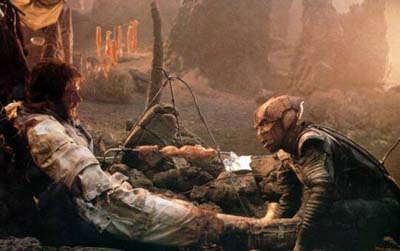I was a teen when I first read Jane Eyre from beginning to end. The decision to read this Charlotte Bronte classic wasn’t prompted by any authority, but sprang from personal shame. An English teacher had assigned Robert Penn Warren’s All the King’s Men, pairing me up with two other students to write a collective essay in response to the book. I didn’t read the book. It wasn’t because I didn’t try. I just couldn’t read the book. And when I went to one of their comfortable middle-class homes to huddle around one of their computers, the jig was up. I was considered an impostor, with the calumnious sigil embedded invisible on my forehead for weeks.
These two other kids were right. I am still very much an impostor. I grew up in a home sullied by blows both violent and verbal, where shrieks from other family members careened around corners and mice scurried and scratched in the walls. The garage was nothing less than a shelter for junk that my parents lacked the effrontery to throw out, and I would have to climb over all manner of bric-a-brac to get the mail (which included a clandestine Playboy subscription addressed to my name, which I read for the pictures and the articles). Embarrassed friends would telephone me, hearing screaming and saying nothing and sometimes offering their homes as momentary refuge. This made it very difficult to read or concentrate or think or feel or write.
I didn’t have a computer; just an ancient electric typewriter with a highly unreliable ribbon and jittery keys. I had learned how to type 100 words per minute in eighth grade, but the contraption made my skills useless. I would type essays on this baleful beast late at night, when the chances of shouting and interruption were slimmer, often needing an hour to hone a paragraph to make sure that the ink didn’t smudge on the liberated bond and the characters hammered to the paper properly. Even one of these very patient hours, which could only come when I was holed up in my bedroom, still required the dutiful applique of white-out (mostly stolen, not purchased; there wasn’t much money). One of my English teachers – a man named Jim Jordan fond of leaving a tally on the blackboard with my name under the heading INANE COMMENTS (he did the same thing to a nice kid named Nick Hamilton; who knows how many aspiring jesters this man tormented over the years?) and who added a horizontal slice every time I overcame my shyness, announced my associative mind, and got the classroom to laugh — decided to condemn me further when I would turn in papers labored over into the early morning. As far as he was concerned, it wasn’t the content, but the pockmarked presentation, something I couldn’t help due to the poverty of my instruments, that offended this Murphy Brown watcher’s sensibilities.
Factor in all the ruthless ribbing, and this was a tough time for me. Misery at home, misery at school. But I tried my best to see the positive side of things. One needed to develop a thick hide to survive. I figured this neoliberal teacher just hated the poor kid with the wild and crazy hair and the trenchcoat and the hat and the Looney Tunes tees (found very cheap at Marshall’s and treated with some care, given that shopping for clothes was a rare occurrence) preventing him from charming a largely middle-class group as patriarchal pedagogue. It was a wonder, years later, that I ended up finding some dodgy living as a guy who wrote about books and that any page in literature spoke to me more than anything Jim Jordan, who hated genre and hated Stephen King and rebuffed my interest in HP Lovecraft and always let the class know all this, had to say over a semester.
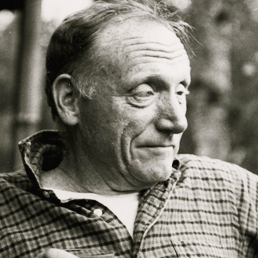 I felt bad about not reading Robert Penn Warren. (Years later, I read the book in its entirety.) I also felt bad when I learned that the two students, whom I thought my friends, ridiculed me to another friend, figuring that I had to be a stupid son of a bitch for not reading Warren. (This third friend defended me, in part because he was also not quite in their class bracket and had some tangible understanding of what I was going through. Vice versa. We’re still friends to this very day. Old soldiers who fought many wars together.) And so I decided to prove to myself that I could read a big book that wasn’t science fiction or fantasy. I plucked a copy of Jane Eyre from a box in another classroom and I brought it home. (I would later do the same thing with George Orwell’s 1984 and Charles Dickens’s A Tale of Two Cities, both of which I was not required to read but did.)
I felt bad about not reading Robert Penn Warren. (Years later, I read the book in its entirety.) I also felt bad when I learned that the two students, whom I thought my friends, ridiculed me to another friend, figuring that I had to be a stupid son of a bitch for not reading Warren. (This third friend defended me, in part because he was also not quite in their class bracket and had some tangible understanding of what I was going through. Vice versa. We’re still friends to this very day. Old soldiers who fought many wars together.) And so I decided to prove to myself that I could read a big book that wasn’t science fiction or fantasy. I plucked a copy of Jane Eyre from a box in another classroom and I brought it home. (I would later do the same thing with George Orwell’s 1984 and Charles Dickens’s A Tale of Two Cities, both of which I was not required to read but did.)
For obvious reasons, I could relate very much to Jane’s early plight in the Red Room and at Lowood. Psychologically abusive family members, teachers who tormented me because I didn’t fit into their suburban idyllic fantasy, feeling stupid and plain – what here wasn’t there to relate to? I had no kind teacher equivalent to Miss Temple at the time, although I would later encounter a marvelous teacher named James Wagner, who not only encouraged me to write by looking upon every essay as an opportunity for fun and mischief, but who paid attention to the prose style contained in my DNA. When my sister took Mr. Wagner’s class a few years later, he said to her, “That’s what I like about you Champions. Short and snappy sentences.”
But once Jane hit Thornfield, I began to despise her and the book. I didn’t like this Rochester fellow who was trying to control her. He reminded me of too many paternal figures who wanted to correct me rather than accept me. And I didn’t like the way that Jane (or Janet, as Rochester called her; a modest corruption of her name that Jean Rhys was to investigate further in Wide Sargasso Sea) wasn’t honest about her feelings. I didn’t like the convenient fortune that Jane encountered later in the book, which seemed a terrible contrivance, and I didn’t like the way that Jane heard Rochester’s voice and how this conveniently urged her to return to Thornfield. Life just didn’t work like this. But I read it to the end and returned the book back to the box, grateful that my fury towards the book would not have to be voiced and shot down by an English teacher who didn’t like me. However, before an eccentric drama teacher (Mr. Cody), I dismissed Jane Eyre as “a Harlequin romance.” I was very surprised when Mr. Cody replied with approbation and enthusiasm.
Still, as much as I hated the book, I have to credit Jane Eyre for giving me a reading discipline I had never known before that time. It hadn’t occurred to me to look at the novel again until there came a time later, more than twice a lifetime later.
January 10, 2011. I publicly pledge to read the top 100 novels of the 20th century, as decided upon in 1998 (about eight years after I read Jane Eyre and about thirteen years before I made the promise) by the Modern Library of America. What I don’t quite comprehend at the time is that Jean Rhys’s Wide Sargasso Sea -– a prequel to Jane Eyre -– is #94. (April 22, 2011 Interjection: Essay on Wide Sargasso Sea now here.) What I also don’t quite get is that there’s a new film adaptation of Jane Eyre set to be released on March 11, 2011.
A few weeks later, I make the connections. I receive an email from Russell Perreault (I’m on one of Random House’s mailing lists) about the movie tie-in edition. After my high school experiences, there’s no way in hell that I’m going to obtain a fresh copy of Jane Eyre on my own. Not from a bookstore or a library. Yet somehow I cannot resist. Through sheer folly and laziness, I send Perreault an email. Much to my surprise, Perreault humors me and a copy of Jane Eyre shows up in the mail days later. My fate is sealed. I can’t exactly ignore this polite gesture. I must reread the book. Who knows? Maybe my adult self will appreciate what my kid self did not.
I arrange to attend a press screening of the movie, with the idea that I’ll have the book reread before I hit the movie. (What I don’t count on is that all this industry triggers thoughts and feelings outlined in the first part of this essay.) I reread the book. I bang out the following Goodreads review:
It shouldn’t be thoughtless to condemn this terrible book, which I read for the second time in my life. The first time was in high school. I hated it then, but I read it to the end — unprovoked by any force in particular, aside from my own flowering self-discipline. I despise this book slightly less now. But I am now most anxious indeed to read Jean Rhys’s corrective prequel, which appears to be much shorter and has the temerity to condemn such terrible characters. Jane Eyre is almost smug in the end, after 600 pages of near helplessness (especially the unintentionally hilarious chapter of her asking around for food and a job: if she were truly smart, she would have contrived the damn escape over time; what does it say about this diabolical doormat that I longed for her to take up prostitution, hoping in vain that my memory of the book was wrong, but knowing the chirpy fate of this dimwitted damsel in distress, who requires an extra-strong dose of feminist enlightenment). Rochester and St. John are two male specimens whom I would not only outdrink, but out think and out act. When Rochester begs Janet to save him, an image of castrated Williamsburg hipsters beating him to a pulp entered my mind. Alas, such a deserved fate was not to be. Don’t get me started on the doddering St. John.
But of course, being very stubborn-minded, I read this damn book to the bitter end. My partner asked me to leave the room because I was talking back so violently to the book, making sounds resembling “Wah wah wah” or something like that when I had to endure pages upon pages of angst. A critic friend says that he never made it past the first half of this book and suggested that I read Wuthering Heights. He may be right, but I think I’m done with the Bronte Sisters for at least a year. I don’t care how groundbreaking this book was on the Gothic front. It’s just plain hokey. Convenient windfalls from dead relatives, hearing Rochester’s voice from afar. Contrived! So you can’t take responsibility for marrying the crazy woman in the attic? Cry me a river. Man up and deal. Don’t take out your problems on your poor servants, illegitimate children, a governess, and so forth. Hey, Rochester, didn’t you see the sign on the boat to Jamaica? YOU BROKE IT, YOU BOUGHT IT. The fact that you view humans as hairy beasts, sir, is part of the problem. Bronte’s understanding of people, even accounting for the centuries, leaves much to be desired too.
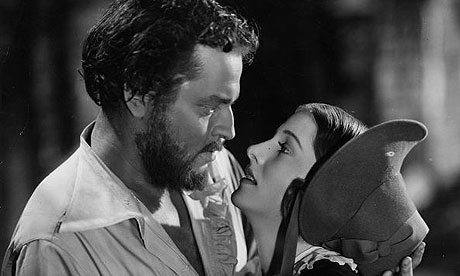
In high school, I understand that many people consider the book to be a masterpiece. And while I don’t share this viewpoint, I do find myself in high school obtaining a VHS copy of the 1943 film starring Orson Welles as Rochester and Joan Fontaine as Jane. I love every damn minute of it. Maybe it’s the melodrama. Maybe it’s the black-and-white. I am familiar then with Citizen Kane and Touch of Evil and the wine commercials and am only just starting to understand what a great cinematic genius Orson Welles was. (My friends only seem to know him from Transformers: The Movie.) There is clearly no better man who can channel Rochester’s oily charisma and convince us why Jane Eyre would fall victim to what would now be very serious sexual harassment in the workplace.
There is, in 1996, a lesser film adaptation with William Hurt in the role. And I learn that George C. Scott has also played him, although I still haven’t seen that version. In college years, I also discover that there’s a 1973 version with Michael Jayston in the part. (I know Jayston as the Valeyard in the 1986 Doctor Who serial, “Trial of a Timelord.”) I track some of these dramatic versions down (not an easy thing to do in the pre-Internet days of video stores and tape trading by mail), but I don’t tell anyone about this adaptation fixation until March 2011, when I write and publish this essay. Perhaps in my secret watching, I am trying my best to find ways of appreciating a book I don’t care for.
“My master’s colourless, olive face, square, massive brow, broad and jetty eyebrows, deep eyes, strong features, firm, grim mouth, — all energy, decision, will, — were not beautiful, according to rule; but they were more than beautiful to me; they were full of an interest, an influence that quite mastered me, — that took my feelings from my own power and fettered them in his. I had not intended to love him; the reader knows I had wrought hard to extirpate from my soul the germs of love there detected; and now, at the first renewed view of him, they spontaneously arrived, green and strong! He made me love him without looking at me.”
Why is Rochester the entry point? Is it because I’m a man? Is it because of this idea of loving someone without the object of your affection looking back at you? I don’t think so. I think it’s because I’m trying to understand why Jane would be so attracted. That’s one of the great narrative mysteries sticking at the back of my mind for years. Even if she doesn’t have much experience with men, and even if the times weren’t exactly friendly for women, it doesn’t make sense that someone brave enough to stand up to the abuses at Lowood would fall for some of Rocheter’s dull philosophy. Yet Rochester, plainly described in that above passage, is charming in these dramatic versions in a way that he isn’t charming in the book.
March 8, 2011. I’m in the Dolby 88 screening room. I know within a minute of first seeing Michael Fassbender in this movie that he doesn’t have what it takes to be Rochester. And it gets worse as the film goes on. He isn’t fierce enough. He doesn’t have the eyes that men like Orson Welles or Oliver Reed had; the eyes that somehow convince you to jump into an abyss before you know you’re falling. When Rochester sits in a chair, the chair has more screen presence. Poor Fassbender looks as if he’s been asked to do nothing but stare intensely at the camera. His arms and legs have pinioned by bad direction.
It doesn’t help that screenwriter Moira Buffini (responsible for Tamara Drewe) has restructured Jane Eyre so that a good portion of the St. John episode comes first (i.e., the movie begins with Jane’s escape from Thornfield, which in itself is a ballsy and interesting choice), followed by a surprising extension of the early business with the Reeds, with the Lowood stuff getting cheapened into what appears to be digital cardboard decor, which results in Rochester’s first appearance getting postponed and the narrative structure collapsing in on itself.
The “pedestal of infamy” mentioned in the book, which is a metaphor, is mentioned directly by an evil teacher in the movie. That’s how literal-minded the script is. The script also includes numerous moments where characters tell each other what they’re feeling, as if Buffini doesn’t understand that this is a visual medium. “How very French,” replies Fairfax after Adele sings a song. “You’re depressed,” says Rochester to Jane Eyre, who doesn’t look depressed. “Your eyes are full,” he also says when they’re not. “You’re blushing,” he says, when she’s not. This technique certainly worked for Lev Kuleshov, whereby Kuleshov cut a blank expression of a man with a bowl of soup (he’s hungry), a girl’s coffin (grief), and so forth – with audiences praising the blank man’s great acting. But that was almost 100 years ago and it relied on visual cues rather than oral ones. You’d think that such bad narrative dialogue would have the simple explanation of lines cribbed directly from the book. In other words, that essential exposition which works in text was simply plucked wholesale and put into the script. But that isn’t the case at all. Because none of these lines are in the book. Buffini (or some tampering studio executive) has added them. Because she (or someone) believes that the audience is a collection of morons.
There is no Miss Temple in this movie. Indeed, the movie cannot afford to offer us any nuances, anything that strays from the cliches. The red-maned Mia Wasikowska is too luminous to be so plain. The movie’s real “machine without feelings” here is cinematographer-turned-director Cary Fukunaga, who comprehends how to capture a world by lantern and candlelight, and even manages a moment of battledore and shuttlecock. But he doesn’t know that cobwebs and dust and flies often clutter up a dark and expansive mansion. Fukunaga isn’t much interested in creating visual atmosphere. He’s into fake scares through an aggressive sound mix, such as a bird flying up into the air. It doesn’t really enhance the story or the mystery or give us a reason to care.
I was an adult when I reread Jane Eyre from beginning to end, and when I realized that my feelings for the classic were just as needlessly prejudicial as the teacher’s enmity towards me. I gave it a try anyway, devoting many unknowing hours trying to reconstruct something that I had locked away in the attic of my mind. My own private Bertha was not insane and would not stay caged and would not set the place on fire. I resolved to approach Jane Eyre again in ten years, when the associations were less fresh and I was presumably more human. The next time around, I will judge it not through the prism of its dramatic iterations, but on the very novel itself. After all, wasn’t it Jane herself who said that repentance is said to be its own cure?
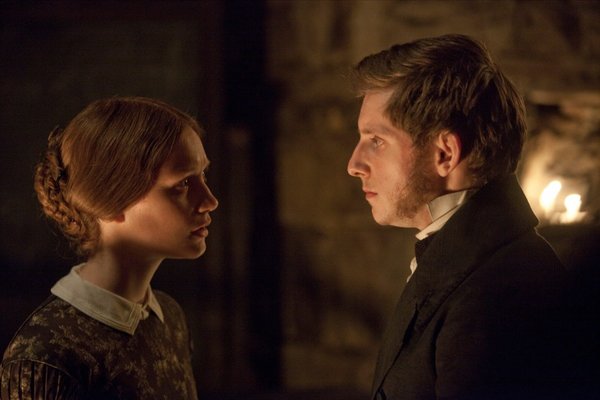
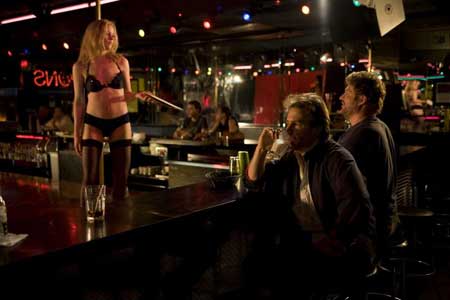
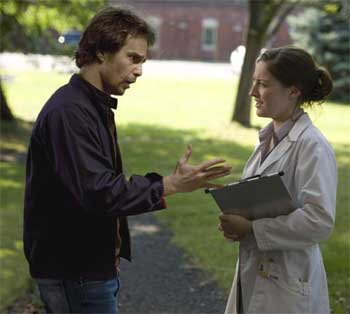 No Country for Old Men‘s Kelly Macdonald appears as Paige Marshall, whose eyes were seemingly invented for the light, but who we know, upon her character’s first step inside the mise en scene, will almost certainly become Victor’s love interest and will almost certainly never live up to
No Country for Old Men‘s Kelly Macdonald appears as Paige Marshall, whose eyes were seemingly invented for the light, but who we know, upon her character’s first step inside the mise en scene, will almost certainly become Victor’s love interest and will almost certainly never live up to 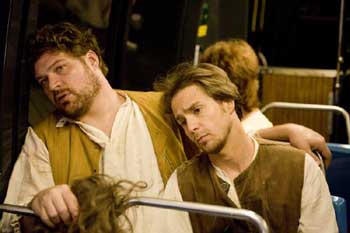 Gregg’s film does disguise New Jersey locations somewhat successfully as the Northwest. The apartments are laced with tacky wallpaper. There are many dead patches of lawn on the historical reenactment site. There are unwashed radiators, grimy kitchen surfaces, and photographs tacked carelessly to walls. But the film’s many flashbacks to the 1970s and 1980s, containing muted browns and the kind of predictable tan jackets and vests that have become something of a production design cliche, reveal that this is more kitsch than verisimilitude. More of a time capsule than a movie of the moment.
Gregg’s film does disguise New Jersey locations somewhat successfully as the Northwest. The apartments are laced with tacky wallpaper. There are many dead patches of lawn on the historical reenactment site. There are unwashed radiators, grimy kitchen surfaces, and photographs tacked carelessly to walls. But the film’s many flashbacks to the 1970s and 1980s, containing muted browns and the kind of predictable tan jackets and vests that have become something of a production design cliche, reveal that this is more kitsch than verisimilitude. More of a time capsule than a movie of the moment. 